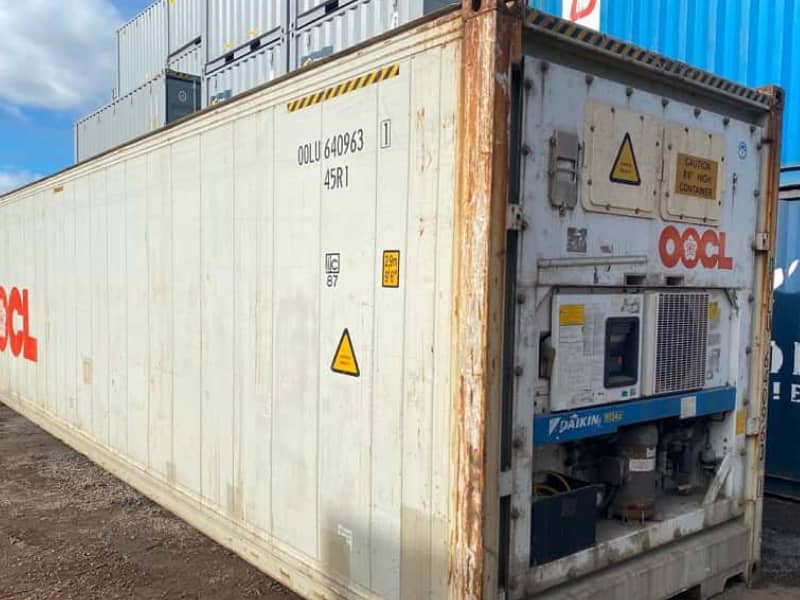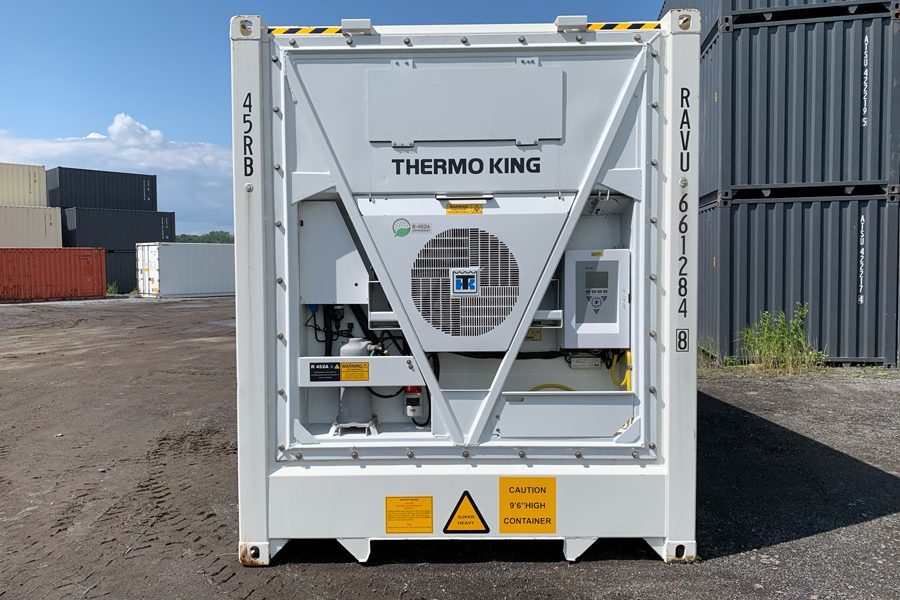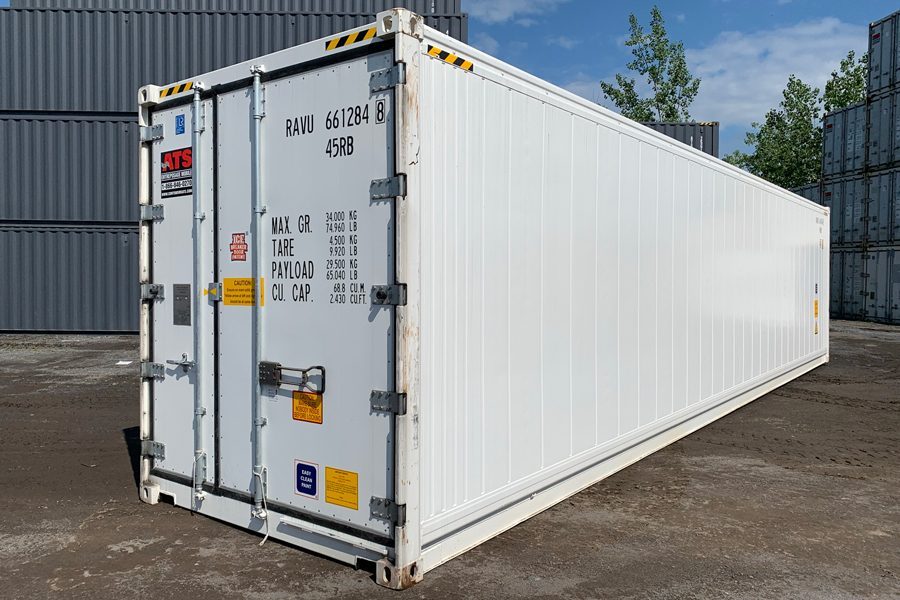All About Freezer Containers: Crucial Insights for Your Storage Needs
Cold store containers play an essential function in the conservation of subject to spoiling goods. They come in various forms, including refrigerated and protected devices, each created for details storage space requirements. Understanding the benefits and key features of these containers is important for services intending to enhance their operations. As the demand for efficient storage solutions expands, checking out the various options offered can cause informed choices that impact both productivity and sustainability. What variables should one take into consideration when choosing the right container?
Sorts Of Cold Store Containers
Cold store containers been available in numerous kinds, each designed to satisfy certain temperature level control requirements. Among the most usual kinds are chilled containers, which preserve temperature levels in between 0 ° C to 10 ° C, making them ideal for subject to spoiling items like fruits, veggies, and dairy products. One more type is the deep fridge freezer container, which operates at temperatures below -18 ° C, ideal for long-lasting storage of frozen things such as meats and seafood.
Shielded containers offer temperature level security without energetic air conditioning, making them valuable for temporary transport of temperature-sensitive products. Additionally, there are portable cold store units, which offer flexibility in areas and are usually made use of in occasions or seasonal procedures. Blast refrigerators rapidly minimize the temperature of hot foods, ensuring safety and security and quality. Each type serves an unique objective in different sectors, from food solution to drugs, highlighting the significance of choosing the right container for specific storage space demands.

Benefits of Utilizing Cold Store Solutions

In addition, freezer solutions expand the rack life of items, lowering waste and raising productivity for companies. By successfully handling inventory with correct temperature control, firms can enhance their supply chains and improve operational performance.
Furthermore, cold store centers enable versatile storage space options, suiting different quantity needs and seasonal variations sought after (used 40ft refrigerated shipping containers). This adaptability aids companies react rapidly to market adjustments
Last but not least, utilizing freezer remedies can guarantee compliance with health and wellness guidelines, safeguarding both organizations and consumers. Generally, the critical use of freezer boosts item administration while advertising sustainability and financial viability.
Key Functions to Seek in Cold Storage Containers
When choosing cold store containers, a number of vital attributes merit mindful factor to consider to secure peak performance and reliability. Temperature control capabilities are vital; containers must preserve constant temperatures suitable for particular goods. Insulation quality additionally plays a substantial function, as remarkable insulation minimizes power usage and enhances temperature level security.
Next off, simplicity of access and loading is crucial; containers should offer user-friendly layouts for effective handling and organization. Longevity is another vital element; weather-resistant materials assure durability and guard materials against ecological aspects.
Furthermore, flexibility features, such as built-in wheels or lifting factors, assist in transportation, while personalized designs enable customized storage services.
Checking systems, including temperature level alarms and remote monitoring, give real-time updates, making specific that conditions stay ideal. By concentrating on these attributes, individuals can select cold store containers that meet their functional needs properly.
Selecting the Right Freezer Container for Your Needs
Selecting the appropriate freezer container requires a thoughtful evaluation of functional requirements and particular requirements. Factors such as the kind of items being saved, temperature level of sensitivity, and volume ought to be focused on. Disposable food products might necessitate containers with strict temperature level controls, while drugs might call for specific problems to preserve efficiency.
In addition, possible customers should think about the container's dimension and wheelchair. A bigger unit may be necessary for bulk storage, while smaller, mobile choices can be optimal for on-site or short-lived demands. Insulation top quality and power performance are likewise critical, as these will influence operational costs and temperature security.
Last but not least, compliance with sector policies and standards is essential, especially in sectors like food and healthcare. By thoroughly reviewing these facets, customers can choose a cool storage container that successfully satisfies their distinct requirements and warranties optimal storage problems.
Best Practices for Maintaining Cold Store Conditions
Keeping suitable freezer problems is vital for preserving the quality and safety of temperature-sensitive products. Regularly monitoring temperature level and humidity degrees is important; using trustworthy digital thermostats and hygrometers can offer exact readings. Moreover, proper insulation of chilly storage containers helps reduce temperature variations and power loss.
Implementing a first-in, first-out (FIFO) system ensures that older inventory is utilized prior to newer stock, reducing waste (used 40ft refrigerated shipping containers). Furthermore, maintaining an arranged layout within the storage space enables for far better air movement and decreases the risk of cross-contamination
Routine upkeep examine equipment, such as seals and compressors, are very important to stop malfunctions. Personnel training on best methods for filling and dumping products helps maintain temperature level stability. Keeping doors closed as much as feasible restrictions warmth exchange, assuring that the chilly storage space environment remains effective and stable in protecting beneficial items.
Expense Factors To Consider for Cold Store Solutions
When assessing freezer solutions, it is crucial to take right into account the first investment prices along with continuous operational costs. An extensive breakdown of these costs get more can disclose substantial long-term financial savings potential for services. Comprehending these financial elements assists stakeholders make informed choices concerning their cold store needs.

Preliminary Financial Investment Prices
The economic landscape of cool storage space containers offers various initial investment costs that businesses should think about. These prices usually include the purchase or rental price of the containers, which can differ based on insulation, dimension, and kind high quality. In addition, expenditures associated to retrofitting existing structures to accommodate freezer should be factored in, particularly if specialized devices is needed. Setup costs, consisting of electric job and refrigeration systems, additionally add to the general initial investment. Companies should not overlook transportation prices for supplying containers to their wanted place. Lastly, potential modification choices, such as shelving or temperature surveillance systems, can better affect the initial economic investment. Careful budgeting for these variables is crucial for successful cold store implementation.
Functional Expenses Failure
Operational expenses for cold store options encompass numerous critical expense considerations that services must navigate. Trick aspects consist of energy prices, which can be considerable as a result of the requirement to keep low temperature levels. Maintenance costs are additionally substantial, as routine maintenance is necessary to guarantee equipment operates effectively and continues to be certified with health and security requirements. In addition, labor costs may develop from the demand for specialized team to manage and keep an eye on the storage space setting. Insurance coverage costs are one more factor to consider, as business have to safeguard their investments against prospective losses. Lastly, any potential governing conformity prices should be factored in, as services may require to buy systems that abide by food safety and security and ecological guidelines. Comprehending these costs is vital for efficient budgeting.
Long-Term Financial Savings Possible
Spending in freezer services provides significant lasting financial savings capacity, transforming first expenditures into financial performance gradually. By lessening putridity and waste, organizations can boost their earnings margins significantly. Advanced insulation and energy-efficient systems decrease energy prices, which collect over the life expectancy of the devices. Furthermore, freezer containers commonly call for less frequent upkeep compared to traditional refrigeration methods, leading to reduced repair work expenditures. The capability to shop items for prolonged periods without endangering quality permits services to utilize on market variations, enhancing income. In addition, the scalability of cold store options enables firms to adapt to altering needs without sustaining excessive expenses. In general, these aspects contribute to a compelling situation for cold store as a cost-effective financial investment approach.
Frequently Asked Questions
Just How Lengthy Can Food Be Stored in Cold Store Containers?
The period food can check my source be saved in cool storage containers differs by type. Normally, perishable products last from days to weeks, while frozen foods can remain risk-free for months, depending on proper temperature and storage go to this site conditions.
Are Freezer Containers Energy-saving?
The energy performance of freezer containers varies based upon layout and insulation quality. Modern units usually make use of sophisticated technology to minimize power usage, ultimately adding to reduced operational prices and environmental effect in long-term usage.
Can Cold Store Containers Be Customized for Particular Needs?
Cold storage containers can without a doubt be tailored to meet details needs. Alterations might include temperature level controls, dimension adjustments, and extra functions, permitting customers to tailor remedies successfully for numerous storage space demands and functional choices.
What Are the Common Sizes of Cold Storage Space Containers?
Cold storage space containers typically can be found in basic dimensions such as 10, 20, and 40 feet. These dimensions fit numerous storage space needs, ensuring versatility for organizations requiring temperature-controlled environments for disposable products or sensitive materials.
Do Freezer Containers Require Unique Permits for Use?
Freezer containers typically call for unique licenses for usage, depending on neighborhood policies and planned applications. Authorities may mandate authorizations to assure security requirements, ecological conformity, and appropriate operational practices are preserved during their usage.
Cold storage space containers come in different kinds, each made to meet details temperature control requirements. Furthermore, chilly storage facilities enable for adaptable storage alternatives, accommodating various volume requirements and seasonal changes in need. Picking the best chilly storage container needs a thoughtful evaluation of operational demands and certain requirements. The financial landscape of cool storage containers provides numerous initial financial investment expenses that companies have to take into consideration. Cold storage containers can without a doubt be personalized to meet specific needs.